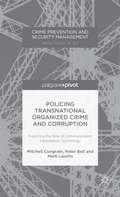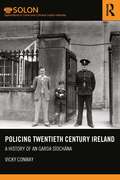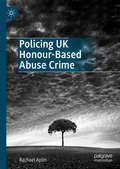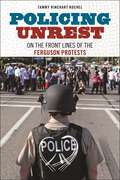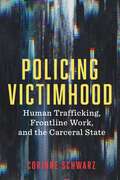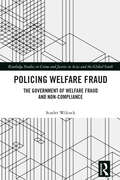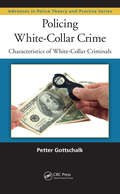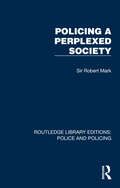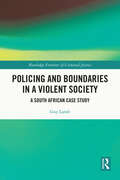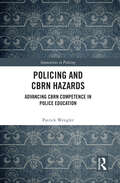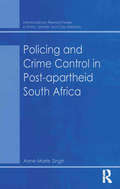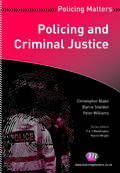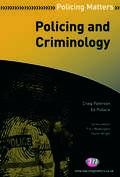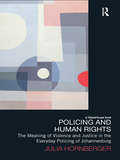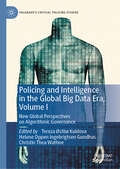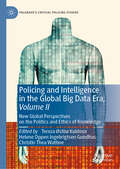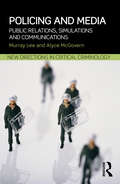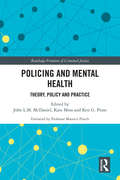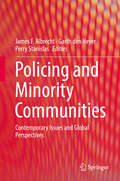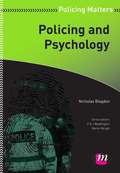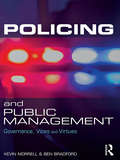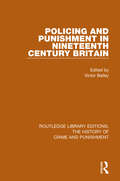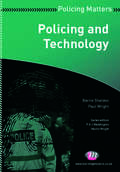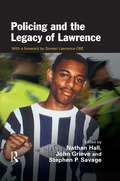- Table View
- List View
Policing Transnational Organized Crime and Corruption: Exploring the Role of Communication Interception Technology
by Peter Bell Mitchell Congram Mark LauchsExamining the role of communication interception technology (CIT) in the investigation of transnational organised crime, the authors demonstrate that a proactive intelligence-led policing framework and a re-evaluation of the constraints of CIT are required to combat the international issue of corruption.
Policing Twentieth Century Ireland: A History of An Garda Síochána (Routledge SOLON Explorations in Crime and Criminal Justice Histories)
by Vicky ConwayThe twentieth century was a time of rapid social change in Ireland: from colonial rule to independence, civil war and later the Troubles; from poverty to globalisation and the Celtic Tiger; and from the rise to the fall of the Catholic Church. Policing in Ireland has been shaped by all of these changes. This book critically evaluates the creation of the new police force, an Garda Síochána, in the 1920s and analyses how this institution was influenced by and responded to these substantial changes. Beginning with an overview of policing in pre-independence Ireland, this book chronologically charts the history of policing in Ireland. It presents data from oral history interviews with retired gardaí who served between the 1950s and 1990s, giving unique insight into the experience of policing Ireland, the first study of its kind in Ireland. Particular attention is paid to the difficulties of transition, the early encounters with the IRA, the policing of the Blueshirts, the world wars, gangs in Dublin and the growth of drugs and crime. Particularly noteworthy is the analysis of policing the Troubles and the immense difficulties that generated. This book is essential reading for those interested in policing or Irish history, but is equally important for those concerned with the legacy of colonialism and transition.
Policing UK Honour-Based Abuse Crime
by Rachael AplinThis book examines the different forms that honour-based abuse crimes take and analyses the discretionary police practices employed when responding to these incidents. Honour-based abuse is an incident or crime involving violence, threats of violence, intimidation, coercion or abuse committed in order to protect or defend the honour of an individual, family and or community for a perceived breach of their code of behaviour. Based on unique UK police data, it includes examination of one hundred honour abuse cases and interviews with fifteen predominantly detective specialist police officers that investigate this crime. This book recognises the challenges encountered when policing honour-based abuse and offers recommendations for addressing them. It will particularly benefit police forces in England and Wales, the Home Office, scholars in gendered violence and policing, and non-government organisations (charities supporting victims) by highlighting some of the issues associated with policing, partnership working arrangements and safeguarding victims of honour-based abuse crimes.
Policing Unrest: On the Front Lines of the Ferguson Protests
by Tammy Rinehart KochelAn up-close account of policing during the Ferguson protests, providing insights from both police officers and members of the communityPolicing Unrest presents the frontline experiences of police officers during the intense three weeks of protest, vigils, looting, violence, and large civil demonstrations in and around Ferguson, Missouri, following the fatal shooting of Michael Brown by a police officer. Looking closely at the lived experiences of police officers and community residents, Tammy Rinehart Kochel raises important questions about police-community relations and the role of police as peacekeepers in support of social justice.Drawing on interviews with dozens of police personnel who policed the protests, Kochel offers insight into their shared experiences and provides compelling personal accounts of how they performed their jobs during the protest. The book covers a range of topics such as police-community relationships and community policing principles; how factors such as police subculture and organizational culture stacked up against social identity during this crisis; the role of an officer’s characteristics, especially an officer’s race, play in an officer’s self-legitimacy; and the implications for police recruitment and training. Kochel’s unique access allowed her to provide a balanced perspective on police officers’ cynicism and public protests against police that were rampant in the year following Ferguson against the need to restore police-community relations and police legitimacy through increased transparency, accountability, and procedural justice. Policing Unrest explains how the Ferguson protests ushered in an era of police reform and reveals what it is like being a police officer facing public unrest, particularly in the wake of widely publicized incidents of police brutality around the country.
Policing Victimhood: Human Trafficking, Frontline Work, and the Carceral State (Critical Issues in Crime and Society)
by Corinne SchwarzSince the turn of the twentieth century, human trafficking has animated public discourses, policy debates, and moral panics in the United States. Though some nuances of these conversations have shifted, the role of the criminal legal system (police officers, investigators, lawyers, and connected service providers) in anti-trafficking interventions has remained firmly in place. Policing Victimhood explores how frontline workers in direct contact with vulnerable, exploited, and trafficked persons—however those groups are defined at personal, organizational, or legal levels—defer to the tools of the carceral state and ideologies of punishment when navigating their clients’ needs. In Policing Victimhood, Corinne Schwarz interviewed with service providers in the Midwestern US, a region that, though colloquially understood as “flyover country,” regularly positions itself as a leader in state-level anti-trafficking policies and collaborative networks. These frontline workers’ perceptions and narratives are informed by their interpersonal, day-to-day encounters with exploited or trafficked persons. Their insights underscore how anti-trafficking policies are put into practice and influenced by specific ideologies and stereotypes. Extending the reach of street-level bureaucracy theory to anti-trafficking initiatives, Schwarz demonstrates how frontline workers are uniquely positioned to perpetuate or radically counter punitive anti-trafficking efforts. Taking a cue from anti-carceral feminist critiques and critical trafficking studies, Schwarz argues that ongoing anti-trafficking efforts in the US expand the punitive arm of the state without addressing the role of systemic oppression in perpetuating violence. The violence inherent to the carceral state—and required for its continued expansion—is the same violence that perpetuates the exploitation of human trafficking. In order to solve the “problem” of human trafficking, advocates, activists, and scholars must divest from systems that center punishment and radically reinvest their efforts in dismantling the structural violence that perpetuates social exclusion and vulnerability, what she calls the “-isms” and “-phobias” that harm some at the expense of others’ empowerment. Policing Victimhood encourages readers to imagine a world without carceral violence in any of its forms.
Policing Welfare Fraud: The Government of Welfare Fraud and Non-Compliance (Routledge Studies in Crime and Justice in Asia and the Global South)
by Scarlet WilcockPolicing Welfare Fraud charts and interrogates the suite of measures ostensibly designed to combat welfare fraud and non-compliance. In Australia, which serves as the empirical focus of this book, these strategies include stringent ID checks, pre-emptive data surveillance technologies including the infamous and illegal ‘robodebt’ programme, a dedicated fraud hotline and an ‘intelligence-led’ fraud investigation framework. Drawing on original documentary and interview data, including interviews with fraud investigators, this book unpacks the logics that underpin these anti-fraud initiatives with a focus on how these initiatives are imbued with logics and practices more readily associated with the criminal justice system. The central argument of the book is that the emergence of contemporary welfare compliance regimes represents a form of ‘governing through fraud’ in which the threat of welfare fraud has effectively necessitated a regime of criminalisation within the welfare state. This has been enabled by a broader process of neoliberal welfare reform, which has cast suspicion over all welfare use. The overall effect of this regime is to restrict access to social security, punish welfare recipients and stigmatise welfare use. Policing Welfare Fraud also highlights points of contradiction and multiplicity in the enactment of specific welfare compliance initiatives, including attempts by welfare officials to moderate or reformulate these strategies ‘on the ground’. These findings demonstrate that the criminalisation of welfare is neither uniform nor inexorable, and that more progressive welfare reform is possible. An accessible and compelling read, this book will appeal to students and scholars of criminology, sociology, politics and those interested in the policing of welfare recipients.
Policing White-Collar Crime: Characteristics of White-Collar Criminals (Advances in Police Theory and Practice)
by Petter GottschalkCombating white-collar crime is a challenge as these criminals are found among the most powerful members of society, including politicians, business executives, and government officials. While there are many approaches to understanding this topic, Policing White-Collar Crime: Characteristics of White-Collar Criminals highlights the importance of po
Policing Wildlife
by Angus NurseWildlife crime is a fringe area of criminal justice, despite its importance as one of the highest value areas of global crime and its long term effects on ecosystems. This book examines the enforcement of wildlife law, one of the fastest growing areas of crime globally. It examines the extent of wildlife crime, the role of NGOs in policy development and practical law enforcement, and considers how justice systems deal with contemporary wildlife crime. Policing Wildlife importantly examines the pressing threat of organised crime and terror groups in wildlife crime. It highlights the weaker enforcement regimes and more lenient attitudes to wildlife crimes by the courts, despite the strong provisions which actually exist in wildlife law. Ultimately, it considers how enforcement regimes need to adapt to contemporary wildlife crime threats and argues for the better integration of wildlife crime into mainstream justice systems.
Policing a Perplexed Society (Routledge Library Editions: Police and Policing)
by Sir Robert MarkShould policemen be armed? Do they want to be? How fair is police interrogation? Are the police too tough on demonstrators? How often are the guilty acquitted? Do we get the police force we deserve? Originally published in 1977, Sir Robert Mark considers these and many other issues. His period as Commissioner of the Metropolitan Police Force would mark something of an epoch, not only because of the challenge of brutal terrorism or his success as a leader, but because he was a bold innovator, thoughtful and articulate, whose work could be readily assessed because he believed in ‘telling the public all you can’ (the official memorandum on this appears here as an appendix). One change affecting the CID, described in this book, is characterised by Sir Robert himself as the most important single change since the Metropolitan Police was founded by his namesake Sir Robert Peel. The opening chapter describes the organisation and functioning of this country’s police at the time, the way in which they epitomise and are restricted by a free society and alone see the whole picture of criminal justice – in a sense here Sir Robert speaks over the heads of the legal profession to the public. The next important chapter contains the first open discussion of modern police-army cooperation in this country, but Sir Robert emphasises that a democratic society cannot be controlled by force and that the police exist for the maintenance of public order, irrespective of party, of sectional interests and of the government of the day. They are an example of the British genius for successful institutional compromise. Subsequent chapters examine these themes in more detail and from different angles; discuss manpower limitations and maldistribution; emphasise how the individual police officer, man or woman, is the anvil on which society beats out the problems of social inequality, racial prejudice and ghettoes, weak and ineffectual legislation. There are chapters on violence and on that London speciality, the demonstration. In the author’s view, the police officer, daily thrown back on his understanding of basic Christian precepts, has now left his Victorian ‘artisan status’ far behind – and the present Metropolitan Commissioner compels consideration of the police officer’s point of view.
Policing and Boundaries in a Violent Society: A South African Case Study (Routledge Frontiers of Criminal Justice)
by Guy LambThis book explores how social and territorial boundaries have influenced the approaches and practices of the South Africa Police Service (SAPS). By means of a historical analysis of South Africa, this book introduces a new concept, ‘police frontierism’, which illuminates the nature of the relationships between the police, policing and boundaries, and can potentially be used for future case study research. Drawing on a wealth of research, this book examines how social and territorial boundaries strongly influenced police practices and behaviour in South Africa, and how social delineations amplify and distort existing police prejudices against those communities on the other side of the boundary. Focusing on cases of high-density police operations, public-order policing and the recent policing of the COVID-19 lockdown, this book argues that poor economic conditions combined with an increased militarisation of the SAPS and a decline in public trust in the police will result in boundaries continuing to fundamentally inform police work in South Africa. This book will be of interest to scholars and students interested in policing in post-colonial societies characterised by high levels of violence, as well as police work and police militarization.
Policing and CBRN Hazards: Advancing CBRN Competence in Police Education (Innovations in Policing)
by Patrick WenglerThis book makes an important contribution to police scholarship by focusing on the critical need for law enforcement personnel to receive education on chemical/biological/radiological/nuclear (CBRN) hazards. Under the CBRN umbrella are chemical warfare agents, toxic industrial chemicals, biologically derived toxins, radiological particulate hazards, and other agents, any of which have the potential to inflict bodily harm, incapacitation, or death. Such weapons have been a part of human history for centuries, starting with biological warfare, later shifting over to chemical warfare, and in the last century, radiological and nuclear warfare. The greater availability and accessibility of such materials necessitates that first response and investigation is no longer limited to the military but is required of police forces reacting to incidents in the community, whether acts of terrorism, traffic accidents, or standard industrial incidents. In this book it is argued that basic knowledge of CBRN is essential for police officers at all levels to assess and protect crime scenes, as well as to investigate cases involving CBRN materials. The author uses case studies and technical education to instruct police on how and when CBRN agents can be used maliciously, and the best methods for identifying, analysing, monitoring, and investigating related incidents. The text makes a clear case for integrating CBRN studies into police education so that first responders are enabled to assess incidents and share information with emergency management and other services to determine the most effective equipment and personnel to deploy. This book is essential for police educators and trainers in both universities and police academies, those administering or engaged in in-service police training, and scholars studying policing, criminal justice, and terrorism.
Policing and Crime Control in Post-apartheid South Africa
by Anne-Marie SinghOnce a marginal political issue, crime control now occupies a central place on the social, political and economic agenda of contemporary liberal democracies. Nowhere more so than in post-apartheid South Africa, where the transition from apartheid rule to democratic rule was marked by a shift in concern from political to criminal violence. In this book Anne-Marie Singh offers a comprehensive account of policing transformations in post-apartheid South Africa. Her analysis of crime and mechanisms for its control is linked to an analysis of neo-liberal policies, providing the basis for a critique of existing analyses of liberal democratic governance. Themes addressed in the book include the exercise of coercive authority, state and non-state expertise in policing, the 'rationally-choosing' criminal, and the importance of developing an active and responsible citizenship.
Policing and Criminal Justice (Policing Matters Series)
by Peter Williams Christopher Blake Barrie SheldonThis text provides an accessible and up-to-date introduction to criminal justice for all those undertaking degrees and foundation degrees in policing. It will also be relevant to degree courses in criminology and criminal justice. The book provides a holistic overview of the Criminal Justice System (CJS) and an exploration of the roles of key players within the system and how the police interact with these organisations. It examines some of the principles that underpin the ′modernisation′ of the police, in particular how the police service collaborates with partner agencies and the rationale associated with the Change Agenda.
Policing and Criminology (Policing Matters Series)
by Craig Paterson Ed PollockA concise and up to date introduction to criminology for those undertaking degrees and foundation degrees in policing, police studies and related subjects. It provides an introduction to criminological perspectives on the development of the police service over the last 200 years alongside an overview of contemporary themes. Key topics include the changing role of policing, police governance and accountability, policing philosophies and strategies and the globalisation of policing. The book also examines the role criminology has played in the modernisation agenda and police reform, the shift to evidence-led policing, and the relationship between criminological theory and police practice.
Policing and Human Rights: The Meaning of Violence and Justice in the Everyday Policing of Johannesburg (Law, Development and Globalization)
by Julia HornbergerPolicing and Human Rights analyses the implementation of human rights standards, tracing them from the nodal points of their production in Geneva, through the board rooms of national police management and training facilities, to the streets of downtown Johannesburg. This book deals with how the unprecedented influence of human rights, combined with the inability by police officers to ‘live up’ to international standards, has created a range of policing and human rights vernaculars – hybrid discourses that have appropriated, transmogrified and undercut human rights. Understood as an attempt by police officers, as much as by the police as a whole, to recover a position from which to act and to judge, these vernaculars reveal the compromised ways in which human rights are – and are not – implemented. Tracing how, in South Africa, human rights have given rise to new forms of popular justice, informal ‘private’ policing and provisional security arrangements, Policing and Human Rights delivers an important analysis of how the dissemination and implementation of human rights intersects with the post-colonial and post-transformation circumstances that characterise many countries in the South.
Policing and Intelligence in the Global Big Data Era, Volume I: New Global Perspectives on Algorithmic Governance (Palgrave's Critical Policing Studies)
by Tereza Østbø Kuldova Helene Oppen Ingebrigtsen Gundhus Christin Thea WathnePolicing and Intelligence in the Global Big Data Era, Volume I, the first of a two volume set, presents a rich and unique collection of global perspectives on data-driven predictive technologies and the expansion and use of surveillance apparatuses in policing and intelligence, both public and private. Centered around the notion of ‘algorithmic governance’, this volume explores various practices of abstract and intelligence-led policing within the context of surveillance and regulatory capitalism. Each chapter interrogates these concepts as much as realities on the ground as they play out across the globe – from Russia, USA, India, Brazil to Denmark, Germany and Norway. The volume offers a unique insight into the ways in which technologies and data-driven practices – from facial recognition, predictive algorithms, to generative AI – are reshaping cultures of policing both within and beyond police proper. Particular attention is paid to the simultaneous privatization and pluralization policing and intelligence and to the proliferation of new intelligence actors. Academics, students and readers interested in the fields of criminology, social anthropology, critical algorithm.
Policing and Intelligence in the Global Big Data Era, Volume II: New Global Perspectives on the Politics and Ethics of Knowledge (Palgrave's Critical Policing Studies)
by Tereza Østbø Kuldova Helene Oppen Ingebrigtsen Gundhus Christin Thea WathneThis volume, the second of a two volume set, offers a rich and unique collection of global perspectives on data-driven predictive technologies and the expansion and use of surveillance apparatuses in policing and intelligence, both public and private. Volume II delves into the epistemologies of data, into the imaginaries of accuracy, and fantasies of technosolutionism, utilizing empirical case studies to interrogate the use of data in policing, while raising questions pertaining to governance, ethics and knowledge construction. The chapters span from exploring the construction of clean and dirty data in private and public policing in South Africa, discussions about facial recognition and technopolitics in Brazil, the construction of intelligence and organizational learning in Norwegian police ethics and broader questions of transparency, data quality, and trust in data-driven policing, to the very topical issues of policing of generative AI and the ways in which both authoritarian and liberal democracies, such as China and India, use biopolitics to turn social welfare into surveillance. Academics and students of criminology, social anthropology, critical algorithm studies, critical sociology, and regional studies, will find this timely volume of interest.
Policing and Media: Public Relations, Simulations and Communications (New Directions in Critical Criminology)
by Murray Lee Alyce McGovernThis book examines the relationship between police, media and the public and analyses the shifting techniques and technologies through which they communicate. In a critical discussion of contemporary and emerging modes of mediatized police work, Lee and McGovern demonstrate how the police engage with the public through a fluid and quickly expanding assemblage of communications and information technologies. Policing and Media explores the rationalities that are driving police/media relations and asks; how these relationships differ (or not) from the ways they have operated historically; what new technologies are influencing and being deployed by policing organizations and police public relations professionals and why; how operational policing is shaping and being shaped by new technologies of communication; and what forms of resistance are evident to the manufacture of preferred images of police. The authors suggest that new forms of simulated and hyper real policing using platforms such as social media and reality television are increasingly positioning police organisations as media organisations, and in some cases enabling police to bypass the traditional media altogether. The book is informed by empirical research spanning ten years in this field and includes chapters on journalism and police, policing and social media, policing and reality television, and policing resistances. It will be of interest to those researching and teaching in the fields of Criminology, Policing and Media, as well as police and media professionals.
Policing and Mental Health: Theory, Policy and Practice (Routledge Frontiers of Criminal Justice)
by Kate Moss John L.M. McDaniel Ken G. PeaseThis book explores the relationship between policing and mental health. Police services around the world are innovating at pace in order to develop solutions to the problems presented, and popular models are being shared internationally. Nevertheless, disparities and perceptions of unfairness remain commonplace. Innovations remain poorly funded and largely unproven. Drawing together the insights of eminent academics in the UK, the US, Australia and South Africa, the edited collection evaluates the condition of mental health and policing as an interlocked policy area, uncovering and addressing a number of key issues which are shaping police responses to mental health. Due to a relative lack of academic texts pertaining to developments in England and Wales, the volume contains a distinct section on relevant policies and practices. It also includes sections on US and Australian approaches, focusing on Crisis Intervention Teams (CITs), Mental Health Intervention Teams (MHITs), stressors and innovations from Boston in the US to Queensland in Australia. Written in a clear and direct style, this book will appeal to students and scholars in policing, criminology, sociology, mental health, cultural studies, social theory and those interested in learning about the condition and trajectory of police responses to mental health. Foreword written by Professor Maurice Punch.
Policing and Minority Communities: Contemporary Issues and Global Perspectives
by Perry Stanislas James F. Albrecht Garth Den HeyerThis insightful book examines the allegations against the professionalism, transparency, and integrity of law enforcement toward minority groups, from a global perspective. It addresses the challenges inherent in maintaining strong ties with members of the community, and draws attention to obstacles in ensuring public confidence and trust in rule of law institutions. Most importantly, the book provides insight into mechanisms and proposals for policy reform that would permit enhanced police-community partnership, collaboration and mutual respect. Acknowledging the consistency of this concern despite geographic location, ethnic diversity, and religious tolerance, this book considers controversial factors that have caused many groups and individuals to question their relationship with law enforcement. The book examines the context of police-community relations with contributed research from Nigeria, South Africa, Kosovo, Turkey, New Zealand, Mexico, Scandinavia and other North American and European viewpoints. It evaluates the roles that critical factors such as ethnicity, political instability, conflict, colonization, mental health, police practice, religion, critical criminology, socialism, and many other important aspects and concepts have played on perceptions of policing and rule of law. A valuable resource for law enforcement practitioners and researchers, policy makers, and students of criminal justice, Policing and Minority Communities: Contemporary Issues and Global Perspectives confronts crucial challenges and controversies in policing today with quantitative and qualitative research and practical policy recommendations.
Policing and Psychology (Policing Matters Series)
by Nicholas BlagdenThis book draws on a range of psychological theories, concepts and research to explore the role and relevance of psychology to modern day policing. It focuses on key issues including psychological theories of criminal behaviour, interpersonal skills, stereotyping and prejudice, profiling,the psychological effects of crime on victims, and burnout and stress on offiers. The text is underpinned by reflectie activities and case studies encouraging a critical understanding of psychology applied to policing practice. This book provides an accessible and up-to-date textbook for those studying and teaching policing, psychology and criminology.
Policing and Public Management: Governance, Vices and Virtues
by Ben Bradford Kevin MorrellPolicing and Public Management takes a new perspective on the challenges and problems facing the governance of police forces across the UK and the developed world. Complementing existing texts in criminology and police studies, Morrell and Bradford draw on ideas from the neighbouring fields of public management and virtue ethics to open the field up to a broader audience. This forms the basis for an imaginative reframing of policing as something that either enhances or diminishes "the public good" in society. The text focuses on two cross-cutting aspects of the relationship between the police and the public: public confidence and public order. Extending award-winning work in public management, and drawing on extensive and varied data sources, Policing and Public Management offers new ways of seeing the police and of understanding police governance. This text will be valuable supplementary reading for students of public management, policing and criminology, as well as others who want to be better informed about contemporary policing.
Policing and Punishment in Nineteenth Century Britain (Routledge Library Editions: The History of Crime and Punishment #1)
by Victor BaileyIn the years between 1750 and 1868, English criminal justice underwent significant changes. The two most crucial developments were the gradual establishment of an organised, regular police, and the emergence of new secondary punishments, following the restriction in the scope of the death penalty. In place of an ill-paid parish constabulary, functioning largely through a system of rewards and common informers, professional police institutions were given the task of executing a speedy and systematic enforcement of the criminal law. In lieu of the severe and capriciously-administered capital laws, a penalty structure based on a proportionality between the gravity of crimes and the severity of punishments was erected as arguably a more effective deterrent of crime. This book, first published in 1981, examines the impact of these two important developments and casts new light on the way in which law enforcement evolved during the nineteenth century. This title will be of interest to students of history and criminology.
Policing and Technology (Policing Matters Series)
by Paul Wright Barrie SheldonThe rapid development of modern technologies is having profound implications on modern-day policing. Recent innovations include the proliferation of sophisticated communication and surveillance devices, developments in road traffic and crime investigation techniques, personal safety equipment, the internet and network and computer forensics, all of which are accompanied by often complex new legislative and regulative requirements. This book ensures that policing students are fully informed and completely up to date with changes, and understand the implications and impact that changing technology brings to practice. Each chapter includes clear objectives, links to the NOS, practical and reflective tasks, case studies and summaries.
Policing and the Legacy of Lawrence
by Nathan Hall John Grieve Stephen P. SavageFebruary 2009 marked the 10th Anniversary of the publication of the Inquiry into the events surrounding the investigation of the murder of Stephen Lawrence. This book marks this anniversary and examines various dimensions of the impact of Lawrence on policing policy and practice. It identifies a series of dimensions and processes associated with British policing in terms of the role that the Lawrence agenda has had on forming and/or shaping policy and practice in that particular area, and in doing so assesses the extent to which the original recommendations and issues raised within the Lawrence Inquiry have been reflected in policy, practice and, importantly policing outcomes in service delivery. The book integrates practitioner and academic reflection on the impact of Lawrence and includes contributions from some of the key policing figures who were involved in post-Lawrence implementation and development programmes. As such the book will be of interest to both an academic police studies/criminology audience and police-practitioner audiences.
